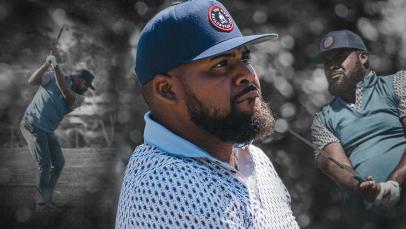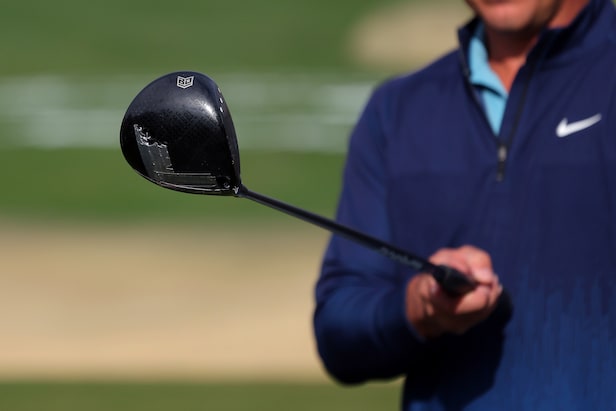Closing the circle: A grateful coach returns to a familiar tournament spotlighting an underserved constituency – Australian Golf Digest

- by Admin
- May 6, 2024

Career trajectories often are not linear, to which Loritz “Scooter” Clark, North Carolina A&T’s new director of golf, can attest. His has been more of a circle, gratitude its center.
Clark may not be widely known in the golf universe, though the 54-year-old warrants greater attention given his lifelong dedication to promoting the game to an underserved constituency, “people of color, to provide access to learn and play the game,” he said.
His résumé includes playing college golf at Southern University and the University of Maryland, becoming a PGA of America professional, an extraordinary career coaching men’s and women’s college teams at Historically Black Colleges and Universities, an unfortunate victim of a lightning strike, and director of the PGA Works Collegiate Championship that debuted in 1987 as the National Minority College Championship.
Clark’s name is synonymous with the PGA Works Collegiate Championship that begins today at the TPC Sawgrass in Ponte Vedra, Fla. It features golfers from Historically Black Colleges and Universities, of which North Carolina A&T is one, Hispanic-serving institutions and other minority-serving educational institutions. It has both men’s and women’s team competitions as well as individual competitions.
Scooter Clark makes his return to the PGA Works Collegiate Championship this week as a coach after spending five years as the tournament director.
Clark, representing Southern University at the time, played in the inaugural National Minority College Championship, the first of four in which he participated. He then transferred to the University of Maryland, and upon graduation turned professional and became a PGA of America member.
He eventually found his way into coaching, both the men’s and women’s golf teams at Bethune-Cookman. Under his tutelage, the two teams won the PGA Works Collegiate a combined 10 times in a span of six years. “I had a really nice stint at Bethune-Cookman. I had a great opportunity there,” he said.
In 2018, he accepted a position as the director of the PGA Works Collegiate Championship, overseeing it for five years before returning to coaching the North Carolina A&T teams that will play in it this week.
“It’s definitely a full circle moment,” he said via telephone last week. “Coming back to coaching, having both men’s and women’s programs. It keeps happening. It’s the continuation of a full circle, though I’m not sure it’s a full circle or a journey along this lines of impacting people and having golf as a platform to influence young people. I’m truly thankful and truly grateful.”
Clark’s history is intertwined with Fred Funk, a Maryland graduate, who won eight PGA Tour events, including the Players Championship in 2005. Clark’s desire to impact others stems in large part of the impact Funk had on him.
“Fred was a very close mentor of mine,” Clark said. “He taught me about the importance of a work ethic, the value of the game and not to take it for granted. It was really about being humbled. That really helped me. We spent countless hours in the evenings on the driving range, under the lights, hitting balls to nine, 10 o’clock at night. He would just spend hours at night hitting his driver. He was the most accurate driver of the golf ball ever. I was a witness to that and was able to practice with him.”
Then came the day that Clark was on the putting green at the University of Maryland golf course, the highest point in College Park, he said. A bolt of lightning struck him in the neck, a direct hit, he said. “Fred, in the shop, called the paramedics. He came out immediately and assisted in CPR. I went through a multitude of complications, seizures, and the prognosis was bleak for me. Through God’s blessing I came through after two to three weeks in the hospital. Fred was a part of that.”
More From Golf DIgest  College Golf This feel-good story will get you excited for college golf’s postseason
College Golf This feel-good story will get you excited for college golf’s postseason  APGA Tour The APGA is back on TV at Torrey Pines and will celebrate a minority golfer’s victory
APGA Tour The APGA is back on TV at Torrey Pines and will celebrate a minority golfer’s victory  FIRE PIT COLLECTIVE Blood, Sweat and Tees: Daniel Augustus has endured tragedy and abuse, but golf continues to drive him
FIRE PIT COLLECTIVE Blood, Sweat and Tees: Daniel Augustus has endured tragedy and abuse, but golf continues to drive him
Clark became an assistant pro at the university golf course, though Funk began prodding him to come to Ponte Vedra, that he would help him get a job at the TPC Sawgrass. “I took him up on that,” Clark said. “He introduced me to the leadership at Sawgrass, and I came down interviewed. I became an assistant pro at TPC Sawgrass for my first job out of college. That was my big break. From there, I went to work for Titleist for a year, a year and half, then back to the PGA Tour in tournament operations. I went to Kemper Sports Marketing, and went to Disney in golf operations. So when you look at the résumé, that résumé is because of Fred Funk.
“Call it a simple act of kindness. Fred made a call to Sawgrass and introduced me, and that was the springboard. Fred never knew the impact of him doing that until six years ago. Six years ago at Caves Valley, the Ford Senior PGA Championship, Fred came to town. I had dinner with Fred and the tournament chair person.”
Funk calls him Sparky, linked to the lightning strike. “He said he saw smoke come out of my chest.” He turned to Funk and said, “Fred, what you don’t realize is that you saved my life, but you also gave me my career and I’ll forever be grateful to you for doing that.
“That’s what carried me in that moment, one simple act of kindness, and he never knew the impact it had. One simple act of kindness when I look at what I’m doing today, coaching to have an impact on kids 18 to 23- years old. To be able to have the opportunity to have that kind of impact, it makes all of it worthwhile.”
This is the full circle, giving back to the game that has given him so much by helping impact student athletes, and returning to the championship in which he played, coached, directed and is coaching again.
This article was originally published on golfdigest.com
The Latest News
-
December 23, 2024Aussies complete series clean sweep against New Zealand
-
December 23, 2024Annabel Sutherland’s sizzling summer continues as Australia ease to win over New Zealand
-
December 23, 2024BREAKING: Aussie grand slam champ accepts anti-doping ban
-
December 23, 2024Kyrgios return ‘super exciting’ for Australian tennis says Alex de Minaur
-
December 23, 2024‘Got some good bants’: Hilarious stump mic warning as Konstas plots secret Bumrah counter





